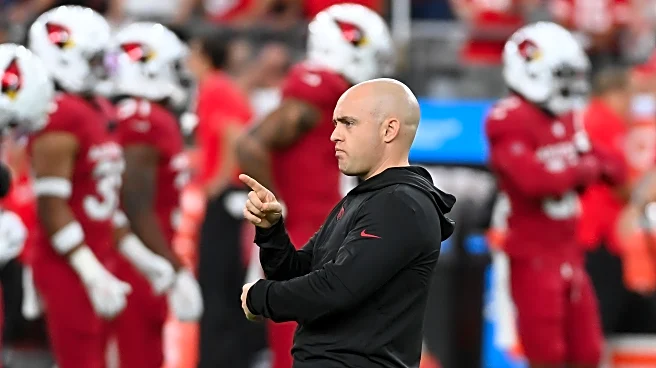What is the story about?
What's Happening?
Colorado Buffaloes football coach Deion Sanders has expressed dissatisfaction with the media narrative following his team's 27-20 loss to the Georgia Tech Yellow Jackets in Week 1. Sanders defended offensive coordinator Pat Shurmur, whose play-calling had been questioned. After a recent 37-20 victory against the Wyoming Cowboys, Sanders highlighted the team's offensive success, which included 497 total yards. He challenged the media's previous criticism of Shurmur, emphasizing the team's improved execution and offensive performance. Sanders also critiqued his team for complacency during the game, despite the win.
Why It's Important?
The defense of Pat Shurmur by Deion Sanders underscores the pressures faced by coaching staff in college football, particularly when dealing with public and media scrutiny. Sanders' comments reflect the challenges of maintaining team morale and confidence amidst criticism. The situation highlights the broader dynamics of sports management, where performance and public perception can significantly impact team strategy and leadership decisions. Sanders' vocal support for Shurmur may bolster the coordinator's standing and influence within the team, potentially affecting future game strategies and player development.
What's Next?
The Colorado Buffaloes are preparing for a challenging stretch of their season, including a forthcoming game against the BYU Cougars. This matchup offers an opportunity for the team to seek revenge for their previous loss in the 2024 Alamo Bowl. Sanders' focus on improving team performance and addressing criticism suggests that the Buffaloes will aim to refine their strategies and enhance execution in upcoming games. The team's response to Sanders' critique and their performance in future matches will be closely watched by fans and analysts.
Beyond the Headlines
Sanders' comments also touch on the cultural aspects of sports, where media narratives can influence team dynamics and public perception. His defense of Shurmur and critique of his team reflect the complex relationship between sports figures and the media, highlighting the impact of external opinions on internal team morale. This situation may prompt discussions on the role of media in sports and the responsibilities of coaches in managing public narratives.














